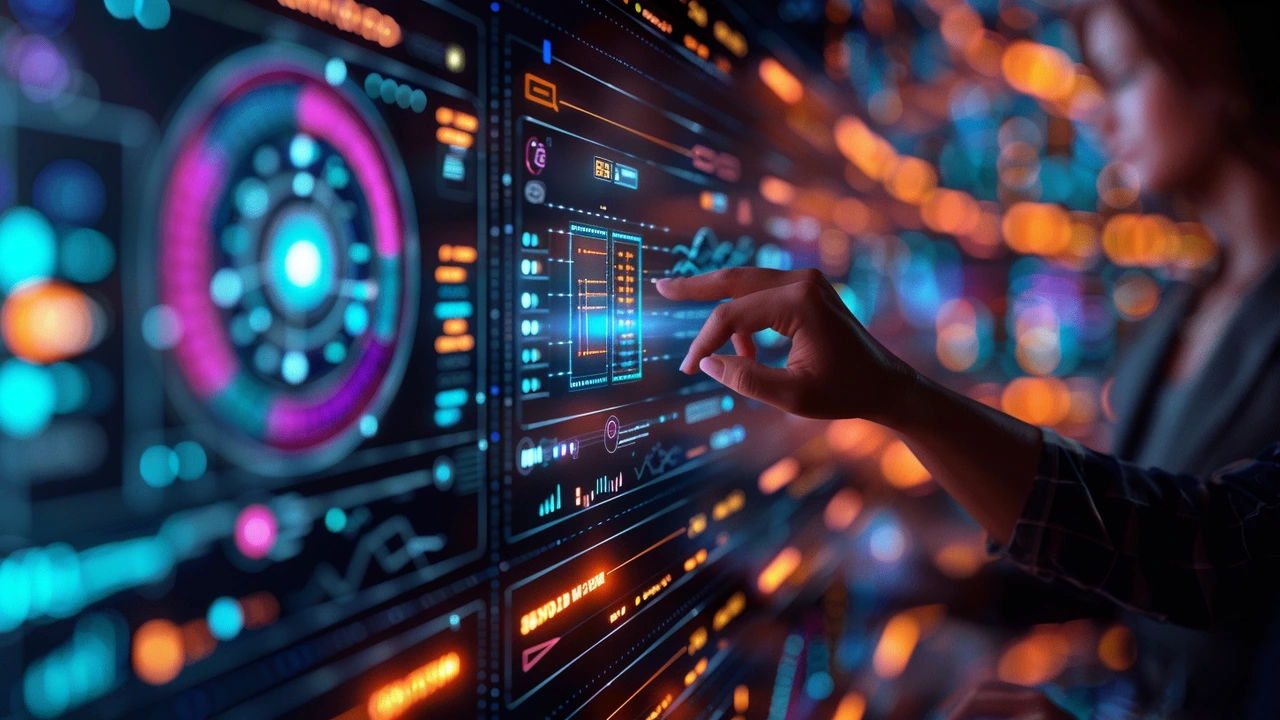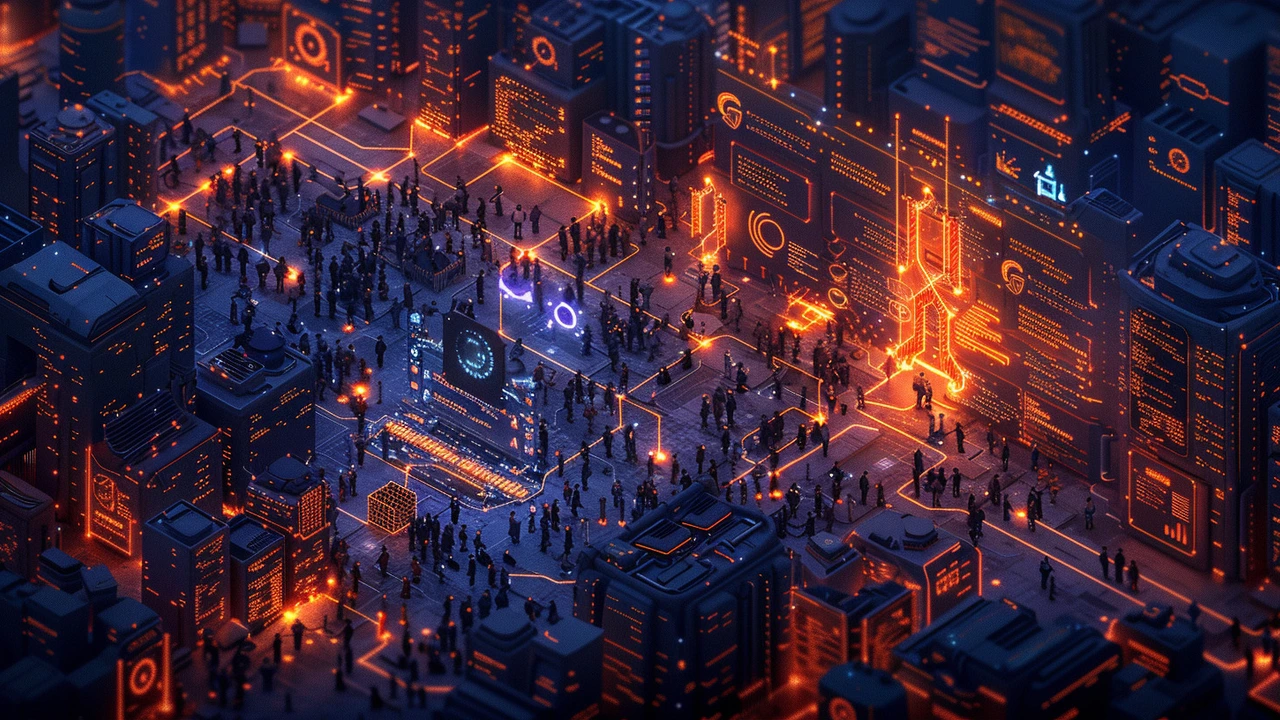Artificial Intelligence (AI) isn't a distant concept from a sci-fi movie anymore. It's right here, transforming how we live, work, and interact with the world.
From enhancing healthcare to boosting productivity in workplaces, AI has revolutionized various sectors. It helps businesses predict market trends, assists doctors in diagnosing diseases, and even personalizes your online shopping experience. The incredible spread of AI means understanding and learning it isn't just beneficial—it's crucial.
Diving into AI might sound intimidating due to some common misconceptions. However, this article will simplify these ideas, explore who is using AI and how, and provide practical steps to get started in learning AI.
Significance of AI
Artificial Intelligence has become an integral part of our lives and its importance can't be overstated. The impact of AI spans various fields, revolutionizing how things are done. One significant area where AI shows its value is healthcare. By analyzing vast amounts of data quickly, AI aids in diagnosing diseases with unparalleled precision. Imagine being able to detect early signs of cancer through advanced algorithms that can process medical images more thoroughly than human eyes.
Another critical sector benefiting from AI is finance. AI algorithms predict stock trends, assist in managing portfolios, and even prevent fraud. These systems analyze market data in real-time, making split-second decisions that could mean the difference between profit and loss. For instance, AI's predictive capabilities are used to assess credit scores, offering a more accurate risk assessment than traditional methods.
In education, AI tools personalize learning experiences. They identify strengths and weaknesses in students, allowing for tailored education plans. This individualized approach means that students can learn at their own pace, improving comprehension and retention. AI tutors are becoming more common, providing instant feedback and support to students, transforming the traditional classroom.
"AI is transforming the nature of work and has the potential to unlock $13 trillion in value by 2030," according to McKinsey & Company.
Retail isn't left behind, either. AI enhances the shopping experience by understanding customer preferences and suggesting products they might like. Ever wondered how online stores seem to know exactly what you need? AI is behind those recommendations, analyzing your shopping behavior and purchase history to offer personalized suggestions.
Moreover, AI plays a crucial role in environmental conservation. Through the use of AI-driven tools, scientists monitor wildlife populations and track illegal activities such as poaching. These applications ensure the protection of endangered species and contribute to biodiversity studies. By providing accurate, real-time data, AI helps in making informed conservation decisions.
Transportation, too, has seen significant advancements due to AI. Self-driving cars, for instance, utilize AI to navigate roads, avoid obstacles, and ensure passenger safety. This technology is expected to reduce accidents significantly and provide efficient transportation solutions. The entire logistics chain also benefits from AI, optimizing routes, and ensuring timely delivery of goods.
In the realm of customer service, AI-powered chatbots handle a myriad of queries, providing quick and accurate responses. This improves customer satisfaction and reduces the workload on human employees. Natural language processing, a branch of AI, allows these systems to understand and respond in human-like ways, making interactions smoother.
AI's significance doesn't stop there. It also plays a pivotal role in scientific research. By simulating complex scenarios and running countless experiments virtually, AI accelerates the pace of discovery. This capability is invaluable in fields like drug development, where understanding interactions at a molecular level can lead to breakthroughs in creating new treatments.
A report by PwC suggests that AI could contribute up to $15.7 trillion to the global economy by 2030. This enormous potential highlights why investing time in learning about AI is not just beneficial; it's essential. As industries across the board continue to integrate AI into their operations, the demand for AI knowledge grows, paving the way for a future where AI plays a central role in our daily lives.

Common Myths of AI
There's a lot of buzz around Artificial Intelligence, and with that comes a fair share of myths and misconceptions. One common myth is that AI will soon replace humans in all jobs. While AI does automate certain tasks, it often creates new job opportunities as well. Many industries use AI to handle repetitive tasks, freeing up humans to engage in more complex, creative activities. This shift in job dynamics highlights the need for people to upskill and adapt rather than fear redundancy.
Another widespread belief is that AI systems are inherently unbiased and objective. In reality, AI can reflect and even amplify the biases present in the data it is trained on. This means that if the training data comes with certain prejudices, the AI will likely perpetuate them. For instance, historical hiring data biased against certain groups can lead to AI systems unintentionally discriminating against those groups in recruitment processes. Experts urge for more diverse data sets and transparent algorithms to combat this issue.
AI is also often thought to be dangerous, potentially leading to scenarios depicted in dystopian films where machines dominate humanity. While AI does come with risks, especially regarding privacy and security, these do not amount to a takeover. Responsible development and ethical standards can mitigate many of these risks, ensuring that AI serves human interests. Notable institutions worldwide actively work on AI ethics to prevent misuse and protect societal values.
"AI will not replace humans. However, humans who use AI will replace those who do not." - Ginni Rometty, Former CEO of IBM
Some people think that AI requires a high level of expertise to understand or work with. The reality is that many user-friendly tools and platforms now exist, making AI accessible to beginners and professionals from various fields. Libraries like TensorFlow and services like IBM Watson offer simplified interfaces and extensive documentation, inviting a broader audience to try their hand at AI projects.
Lastly, a common yet mistaken notion is that AI development happens in isolated labs, far removed from everyday life. On the contrary, numerous AI advancements stem from collaborative efforts between academia, industry, and even hobbyist communities. Open-source projects and platforms like GitHub allow individuals worldwide to contribute to AI research, hastening its growth and fostering innovation.

Real-World Applications
Artificial Intelligence is permeating various industries and making a huge difference. Let's start with healthcare. AI helps in diagnosing diseases faster and with greater accuracy. Systems like IBM's Watson can analyze vast amounts of medical data to provide doctors with treatment recommendations. AI algorithms can read thousands of X-ray images far quicker than radiologists, identifying issues such as tumors that might be missed by the human eye.
Another field where AI shines brightly is finance. Banks and financial institutions rely on AI to detect fraud by analyzing transaction patterns and flagging unusual behavior. It also helps in credit scoring by assessing the creditworthiness of borrowers far more accurately than traditional methods. Robo-advisors are emerging, helping people invest based on their financial goals, thus democratizing access to financial planning.
In retail, AI is redefining the shopping experience. E-commerce platforms utilize AI to personalize your shopping journey. Ever wondered how Amazon knows exactly what you are looking for? That's AI-driven recommendation engines at work. These systems analyze your browsing history, past purchases, and even current trends to suggest products tailored just for you, increasing both your satisfaction and the company’s sales.
Manufacturing is another area transforming under AI’s influence. Factories are using AI to predict equipment failures before they happen, significantly cutting down on maintenance costs and downtime. Robots powered by AI are taking over monotonous and high-risk tasks, boosting productivity and ensuring worker safety. Smart factories, running on AI, are becoming more common, optimizing production lines and managing supply chains with remarkable precision.
The transportation sector is seeing revolutionary changes thanks to AI as well. Autonomous vehicles are no longer fiction but reality. Companies like Tesla and Waymo are developing self-driving cars that use AI to interpret data from various sensors and make real-time driving decisions. AI also helps in route optimization for logistics companies, ensuring faster and more efficient deliveries. This not only saves time but also reduces fuel consumption, contributing to a greener planet.
Entertainment and media are not left out when discussing AI’s impact. Streaming services like Netflix or Spotify utilize AI to curate content that aligns with user preferences. Interactive AI, seen in video games, creates more immersive experiences by learning from player behavior and adjusting difficulty levels automatically. Facial recognition technology, a subset of AI, is being used in security checks at airports and even for unlocking your smartphones.
Education systems are getting smarter with AI-enabled platforms offering personalized learning experiences. These platforms assess a student’s strengths and weaknesses and tailor content accordingly, making learning more effective. Virtual tutors are available round the clock, providing students with immediate assistance and feedback, thus enhancing the educational journey.
AI is also making waves in agriculture. Farmers use AI-driven tools to monitor crop health through drone imagery and sensors that provide real-time data. Predictive analytics help in determining the best time to plant and harvest crops, maximizing yield and minimizing resource usage. This precision agriculture leads to more sustainable farming practices.
"AI is not just a tool; it will benefit our society by streamlining complex operations and handling large-scale problems," said Andrew Ng, co-founder of Google Brain and leading AI researcher.These are just the tip of the iceberg when it comes to the real-world applications of AI. As technology progresses, AI will continue to evolve, finding its way into more aspects of human life, providing innovative solutions to both simple and complex problems.

Tips for Learning AI
Diving into the world of Artificial Intelligence (AI) may seem like a gargantuan task, but breaking it down into manageable steps makes it more approachable. Let's start with the basics. One of the first steps in understanding AI is getting familiar with programming languages that are widely used in AI development. Python is the most popular due to its simplicity and the extensive range of libraries available such as TensorFlow, Keras, and PyTorch.
Before delving into the more advanced topics, having a foundational understanding of mathematics is crucial. Linear algebra, calculus, and probability are essential because they form the backbone of many AI algorithms. For instance, understanding how gradient descent works in neural networks cannot be grasped without knowing calculus. It's worth spending time with these fundamentals as it will make advanced concepts easier to digest later on.
An excellent way to learn AI is through hands-on projects. Real-world projects not only reinforce learning but also add depth to your understanding. Websites like Kaggle and GitHub offer numerous datasets and project ideas. Engaging in these platforms allows you to practice coding, understand nuances of data manipulation, and network with like-minded individuals. Working on projects such as image recognition, natural language processing, or predictive analysis can greatly enhance your practical skills.
If you want to master AI, “get your hands dirty with data” said Andrew Ng, co-founder of Coursera and an adjunct professor at Stanford University.
Now, let's talk about the availability of resources. The internet is a treasure trove of information. Free courses from platforms like Coursera, edX, and Udacity can be a great starting point. These courses are often designed by industry experts and provide structured learning paths. Books such as 'Artificial Intelligence: A Modern Approach' by Stuart Russell and Peter Norvig are considered classic texts in the field.
Another aspect to consider is joining online communities. Forums like Reddit, Stack Overflow, and specialized AI communities can serve as a valuable resource. Engaging with these communities provides not only solutions to coding problems but also insights into the latest trends and research in AI. Networking with peers can lead to collaborative projects and further your learning.
Lastly, consistency is key. It's important to dedicate regular time to study and practice. Setting daily or weekly goals can help in maintaining a steady progress. Start small, maybe with daily coding practice or a weekly project milestone. Gradually, these small steps add up and you'll find yourself more confident and knowledgeable in the subject. Learning AI is not a sprint but a marathon, and persistence will surely pay off.

